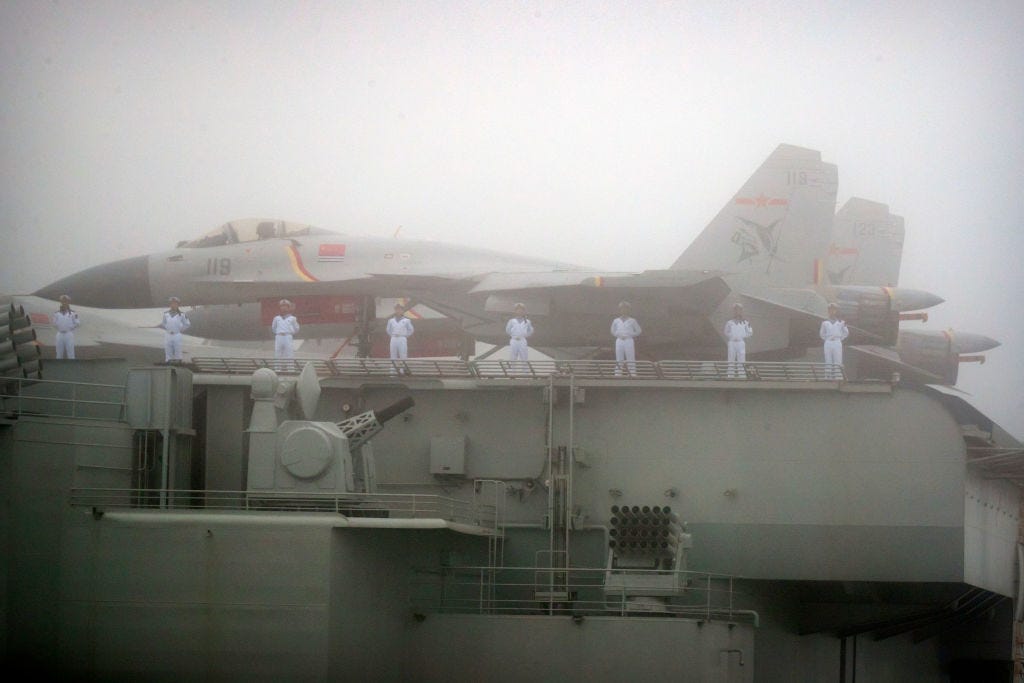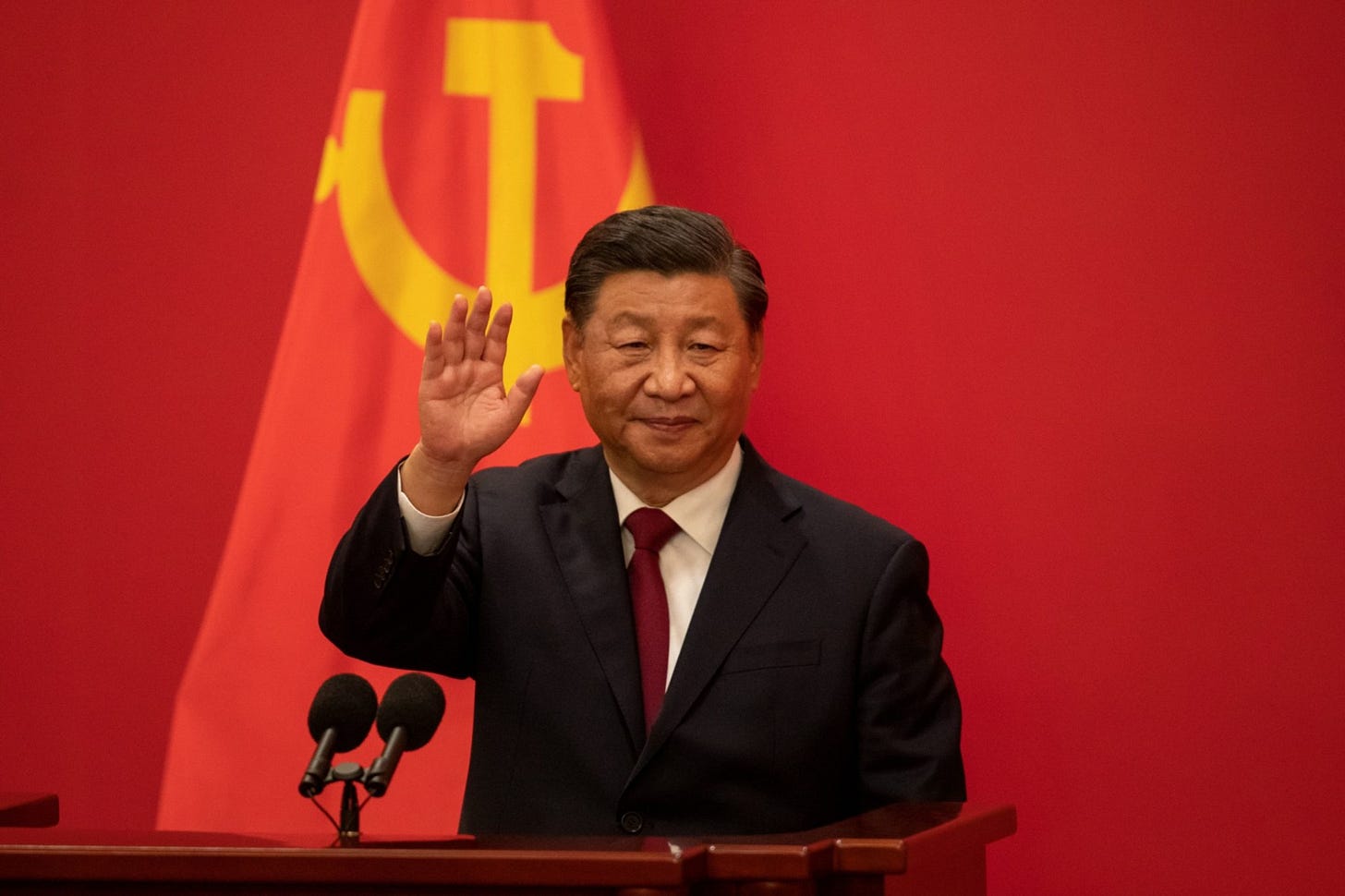Xi Jinping and China: Running Out of Time, Ready to Strike
Source: https://www.gatestoneinstitute.org/20788/china-xi-ready-to-strike
by Gordon G. Chang
Why is Chinese President Xi Jinping moving so fast at this time to exert control over peripheral waters? Prominent China analyst Willy Lam wrote last October that China's leader perhaps sees a closing window of opportunity and therefore is in a hurry to annex territory.
Whether he goes to war or not, he is getting ready to do so. Both the Financial Times and CNN have reported that businesses have been establishing military units inside their organizations. "Chinese Companies Are Raising Militias Like It's the 1970s," the cable network reported.
Xi is engaged in the fastest military buildup since the Second World War. In addition, he is purging military officers opposed to war, trying to sanction-proof his regime, stockpiling grain and other commodities, surveying the U.S. for nuclear weapons strikes, and mobilizing civilians for war.
His economic policies emphasize war preparation, and he looks determined to take China into battle, regardless of prospects. "Even if we cannot win, we must fight," Xi is reported to have said to military officers in 2017, in connection with Taiwan.
I believe that Xi wants war — or at least a ramping up of tensions — to prevent senior Chinese leaders from moving against him. He is not looking to rally the Chinese people with provocative actions or even an attack; he wants to defang political opponents in the Communist Party.
Xi may not yet have made the decision to go to war, but he has clearly made the decision to risk war. That means he can strike when we least expect it.

In recent weeks, China has surged its naval fleet into both surrounding and far away waters.
Most significantly, the People's Liberation Army Navy sent two strike groups into the South China Sea. The larger, centered on the Shandong aircraft carrier, operated off the main Philippine island of Luzon before transiting into the Western Pacific for blue water flight operations. The other is an Expeditionary Strike Group led by a Type 075 Yushen-class amphibious assault ship, one of China's largest and most advanced. Four of China's Type 055 Renhai-class cruisers, described as "the most lethal surface combatant in the world," escorted the two strike groups.
China's newest aircraft carrier, the Fujian, has been on its third set of sea trials.
China and Russia began "Exercise Joint Sea-2024" at the Zhanjiang port in southern Guangdong province, the headquarters of the Chinese navy's South Sea Fleet.
A total of 56 aircraft — the most ever in a single day, according to Taiwan's Ministry of National Defense — flew into Taiwan's air-defense identification zone, some coming as close as 33 nautical miles of the southern tip of the main island of Taiwan. Another 10 Chinese planes flew outside the zone at the same time.
Chinese Coast Guard cutter 5901, dubbed "the Monster" because of its 12,000-ton displacement, was spotted near Sabina Shoal of the Philippines, in the South China Sea.
Finally, four Chinese naval combatants transited nearby Alaskan islands, staying out of territorial waters but coming inside the U.S. Exclusive Economic Zone, the band of water between 12 and 200 nautical miles from the shoreline. As James Fanell, co-author of Embracing Communist China: America's Greatest Strategic Failure, told Gatestone, this is the fifth time since 2015 that China dispatched warships inside the American EEZ.
"In the past couple weeks, the Chinese Communist Party has demonstrated to the region—and more importantly to Washington—that the People's Republic of China is the master of the seas in the Indo-Pacific," said Fanell, also a former U.S. Navy captain who served as director of Intelligence and Information Operations at the U.S. Pacific Fleet.
Why is Chinese President Xi Jinping moving so fast at this time to exert control over peripheral waters? Prominent China analyst Willy Lam wrote last October that China's leader perhaps sees a closing window of opportunity and therefore is in a hurry to annex territory.
At a June conference of military officers in one of China's most famous revolutionary bases, Xi reportedly made dire-sounding statements. "We are here in Yan'an to hold a military meeting, preparing for a civil war," he said, in one version of his talk. The text of his remarks, now widely circulating, remain unconfirmed.
Whether he goes to war or not, he is getting ready to do so. Both the Financial Times and CNN have reported that businesses have been establishing military units inside their organizations. "Chinese Companies Are Raising Militias Like It's the 1970s," the cable network reported.
Xi is engaged in the fastest military buildup since the Second World War. In addition, he is purging military officers opposed to war, trying to sanction-proof his regime, stockpiling grain and other commodities, surveying the U.S. for nuclear weapons strikes, and mobilizing civilians for war. At the same time, he is reasserting state control over the economy, financial markets, and virtually all other aspects of society. He is, in short, bringing back totalitarian controls to China.
Those controls are, among other things, choking the economy. Beijing on July 15 reported 4.7% year-on-year GDP growth in the second quarter, but that number is hard to reconcile with signs of a stagnating economy. The country, for instance, is flirting with deflation, which is inconsistent with the reported robust expansion.
The problem is that Xi refuses to empower consumers so that they can create a consumption-based economy. Why would he reject near-unanimous advice to put money into the hands of ordinary Chinese? Among other reasons, doing so would undercut his efforts to build a wartime economy.
"Xi Jinping's propagandists desperately try to paper over the fact that there is a growing crisis of confidence in his regime to reverse the economic decline caused by the re-imposition of neo-Stalinist Mao-era policies," Charles Burton of the Prague-based think tank Sinopsis told Gatestone. "His repudiation of the progressive 'opening and reform' agenda of Deng Xiaoping and his successors has led to a severe downward spiral. This is matched by increasingly popular dissatisfaction with Xi's repressive personality cult leadership."
Xi has a chance — perhaps his last — to reverse trends. The Communist Party's Third Plenum, which started on July 15, is held once every five years and is traditionally devoted to economic matters. Optimists had hoped that Xi would signal new policies, but now expectations are exceedingly low as it appears he will instead double down on state-led initiatives to bolster manufacturing and infrastructure spending.
His economic policies emphasize war preparation, and he looks determined to take China into battle, regardless of prospects. "Even if we cannot win, we must fight," Xi is reported to have said to military officers in 2017, in connection with Taiwan.
Why would he say something like that? After all, war, especially war on Taiwan "compatriots," would be exceedingly unpopular with China's unhappy people at this moment.
I believe that Xi wants war — or at least a ramping up of tensions — to prevent senior Chinese leaders from moving against him. He is not looking to rally the Chinese people with provocative actions or even an attack; he wants to defang political opponents in the Communist Party.
"If the upcoming Communist Party Third Plenum fails to come up with dramatic measures to restore faith in the Party's ability to turn things around," Burton, also a former Canadian diplomat serving in Beijing, said, "the sole option for Xi to stave off his inevitable removal from office would be to put China on a nationalistic war footing and engage in precipitous action against Taiwan or some other neighbor."
Xi's hero, Mao Zedong, rallied the Chinese people with the Cultural Revolution not to obtain their support but to use them to take down senior leaders who had been plotting to depose him. Xi might adopt this tactic, except this time looking for a quick seizure of territory or maybe just keeping regional tensions high.
The situation, however, could get out of hand, triggering conflict around the region — or the world. Xi, unfortunately, could become desperate, and if the situation continues to deteriorate he may not care about the odds.
Xi may not yet have made the decision to go to war, but he has clearly made the decision to risk war. That means he can strike when we least expect it.
Gordon G. Chang is the author of The Coming Collapse of China and China Is Going to War, a Gatestone Institute distinguished senior fellow, and a member of its Advisory Board.



